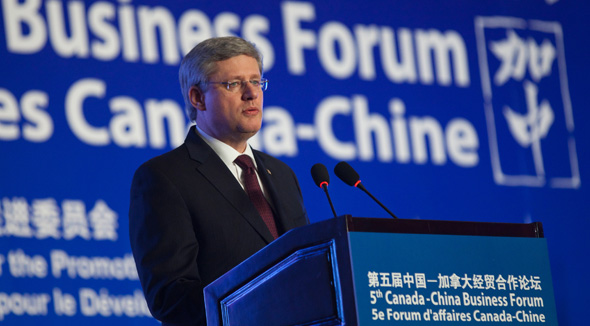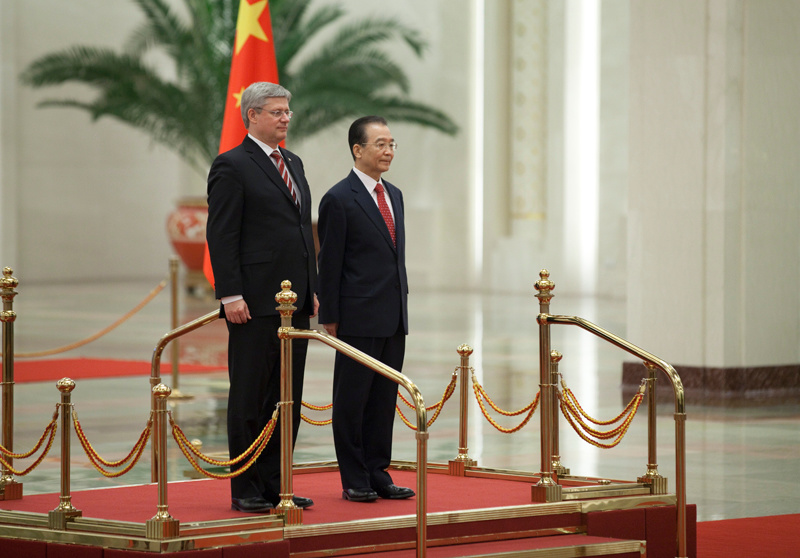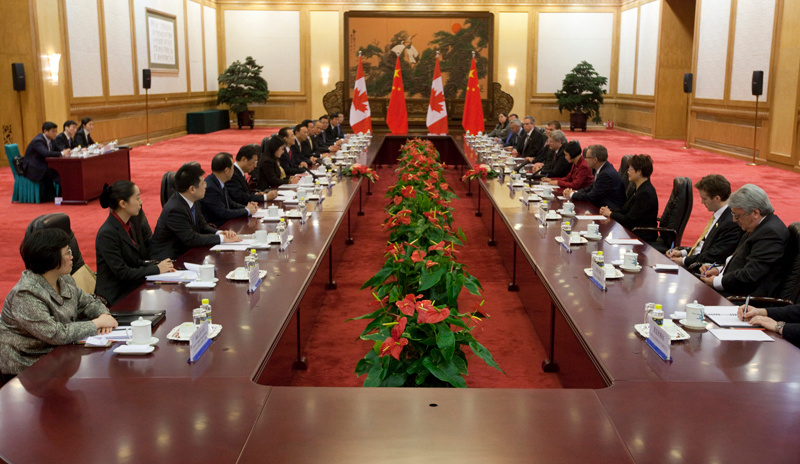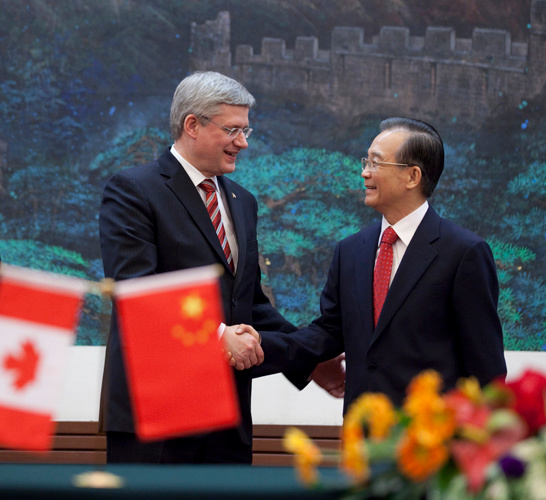This post is the first of a series on the Canada-China Investment “Straitjacket:” Exclusive Interview with Gus Van Harten. You can access Part 2 here and Part 3 here.
I recently picked up a copy of Francis Fukuyama’s 2011 book, The Origins of Political Order. Sitting on the bedside table at the house I was staying at, the book made for some ‘light’ bedtime reading. I heaved the enormous tome onto my lap and, opening it to a random page, read this alarming passage:
There is no rule of law in China today: the Chinese Communist Party does not accept the authority of any other institution in China as superior to it or able to overturn its decisions. Although the People’s Republic of China has a constitution, the party makes the constitution rather than the reverse. If the current Chinese government wanted to nationalize all existing foreign investments, or renationalize the holdings of private individuals and return the country to Maoism, there is no legal framework preventing it from doing so. (Pg 248)
My concerns with China’s treatment of foreign investments arose in light of China’s recent bid for Nexen, a Canadian company with large holdings in the Alberta tar sands. Since Canada is having trouble with the management of the tar sands now, what would it look like if we had Chinese state-owned enterprises like the Chinese National Offshore Oil Company (CNOOC) in the mix?
It turns out the problem is of magnitudes greater than I had originally conceived, and concerns not only Canada’s management of its resources, but its sovereignty, its democracy, and the protection of the rights and values of its citizens.
Perhaps most strikingly, Canada is embracing this threat, showing telltale signs the real culprit in this dangerous deal isn’t China at all.
In order to untangle the web of an international trade deal as complex as the China-Canada Investment Treaty, which establishes the terms of the Nexen deal – the biggest overseas takeover by a Chinese company – I spoke with Professor Gus Van Harten of Osgoode Law School, an expert on foreign investment deals of this sort.
Below is Part 1 of our interview:
Carol Linnitt: Thanks for taking my call, and for making time for me to ask you some questions. I really appreciate that.
Gus Van Harten: No problem at all.
CL: I guess I’ll just jump right in. The first question I have regards Canada’s sovereignty over its resources when it engages in these kinds of transactions with state-owned enterprises. Could you talk about Canada’s ability to maintain its sovereignty over the tar sands with this potential Chinese acquisition of Nexen under the Canada-China investment deal?
GVH: Okay, so when we talk about sovereignty, the way a country exercises sovereignty over its territory is by being able to pass laws and enact regulations that apply to companies and anyone else operating in its territory. And if there are any disputes about the laws or the regulations, then those get decided in the courts of the country.
What’s really different about the China-Canada investment deal – although it tracks especially NAFTA in Canada’s case, although NAFTA obviously relates to American investors – is that it allows disputes about how laws and regulations or even court decisions have been made, to be decided outside of the Canadian courts. So they’re decided by international arbitrators at the option of the investor…and the China-Canada investment deal and many of these other investment treaties … give the power, and quite immense power, to the investor to challenge any decision that Canada would make, whether by the Canadian Parliament, or a provincial legislature, by the Supreme Court of Canada or a lower court, or by Cabinet or some low-level government official. Anything can be challenged by skipping Canadian courts and going straight to these international arbitrators.
And the international arbitration process, for a number of reasons, is really, I would say, without wishing to make personal allegations about any of the arbitrators, objectively slanted in favour of the investors. That’s not unique to the China-Canada deal. But what is unique is that this is the first time since NAFTA that Canada is entering into a deal that allows for these kinds of lawsuits with a country that is likely to have investors that own a lot of assets in Canada. Okay? You get my drift?
CL: Yes.
GVH: So Canada has other investment deals with countries like Romania, but there are not a lot of Romanian investors in Canada. There are more Canadian investors in Romania. But in this case it seems very likely that there will be a lot more Chinese investment in Canada than Canadian investment in China, and that’s because the China-Canada investment deal has another element, which is that it does not require each country to open up its economy to investment from the other country. Now, Canada is already very open to foreign investment, including Chinese investment, whereas China is relatively closed.
So for that reason, going forward, we are likely to see major purchases of assets in the resource sector, especially the oil sands obviously, by Chinese companies, but I don’t think we’re likely to see anything like the same amount of investment by Canadian companies in China, because the Chinese government won’t allow it, it puts more restrictions on foreign investments. You have to do a joint venture, for example.
They just won’t allow their major companies to be bought up by foreigners in the way that Canada has in the last 10, 15 years. And Canada is increasingly open to having that done, because the Harper government has raised the threshold for the review of foreign takeovers of Canadian companies under the investment Canada Act from about 330 million now, it’s going to go up in about 5 years to 1 billion dollars, meaning the Chinese can buy any Canadian company worth less than a billion dollars without any government review, under the usual process, under the Investment Canada Act. So the Nexen takeover is subject to review because it’s worth more than a billion but there could be a lot of purchases by Chinese investors we won’t even hear about.
The point is, we’re open to foreign investment, and it’s only once the investment is allowed in that the rights of the foreign investors kick in under the deal. So it’s much more likely that Chinese investors will benefit from being able to sue any Canadian exercise of sovereignty than vice-versa.
CL: What kind of potential litigation do you see happening? What are the types of regulatory frameworks or legal frameworks that you could foresee being a problem, say in the development of the tar sands?
GVH: I’ve tracked all the known investment treaty lawsuits brought by companies, and most of these lawsuits are brought by American and Western European companies against developing countries. But there’s been a lot of lawsuits against Canada under NAFTA, and Canada’s been sued more than any other developed country. A Chinese company just launched its first lawsuit against Belgium for two or three billion dollars, which is a very large amount, involving the kind of winding-down or takeover of a Belgian bank, in which the Chinese invested before the last financial crisis. So it’s quite reasonable to expect Chinese investors will be in a position to sue Canada in the way that other companies have sued other countries under these treaties.
Now in tracking those cases to date, there are about 300 that have led to a known decision, not all of which you can really evaluate, so it’s maybe between 150 and 200 that can be evaluated on this point; that is, what kind of disputes do they relate to? There are four main areas:
1) One of the major areas is resource disputes. Resource disputes lead to a lot of investor lawsuits in cases to date.
2) Another area is environmental and health regulations, and I would say most of the lawsuits against Canada under NAFTA, there have been about 30, relate to one of those two areas, a significant majority. So we have a reasonable basis to expect that Chinese investors, where we make decisions in the resource sector and/or related to health and environmental regulations, that they will generate lawsuits under investment treaties.
3) The other two areas incidentally are privatisation, disputes arising from privatisation of major infrastructures, such as water systems or gas transmission lines, led to a lot of disputes. So if we’re talking about a privately owned pipeline, subject to regulation in Canada, then that is also an area that’s ripe for investor-state disputes that could be resolved by these arbitrators.
4) The fourth area is tax disputes and financial sector disputes, and those often link in to the resource sector too, because a government will, for example raise royalty rates on the basis that there has been a windfall profit. This has happened in the oil and gas sectors. Many countries have put new taxes on what they consider to be windfall profits by companies in the relevant sector, and those have generated disputes.
So I really can’t imagine any area of government decision making in Canada other than the resource sector specifically, with the huge money that’s going to be wrapped up in the oil sands, and on piping the oil out of the oil sands, that would be more likely to lead to disputes involving Canada.
When we open up other areas of the resource sector, like in the north, in northern Ontario, the Ring of Fire, those will also be ripe for disputes if there’s a significant foreign investment, which there almost certainly will be.
The biggest loss for Canada under NAFTA was a lawsuit brought by companies owned partly by Exxon against Canada, because of Canada and Newfoundland & Labrador’s process for putting research and development spending requirements on companies operating in the Hibernia, Terra Nova oil projects were objected to by the foreign Exxon-owned companies. The tribunal based that decision on a reading of Canada’s exceptions, Canada actually had exempted Hibernia and Terra nova from the NAFTA provisions, but the tribunal apparently adopted a, very unfriendly for us, interpretation of those exceptions, making them very narrow, and we lost on that basis. This is significant because we’re relying on the same types of exceptions in the Canada-China deal.
CL: So that means that not only can China, say for example, challenge the current regulatory framework, but they can also retroactively challenge pre-existing Canadian decisions about Canadian resources?
GVH: Yes, they can challenge existing decisions, and they can challenge existing legal frameworks, although there are grandfathering provisions with respect for some of the standards in the treaty. But it gets quite complicated as to which existing laws are exempted and which are not, and this goes back to the point about the case I just mentioned. It’s that the arbitrators may not consider Canada’s exceptions for its existing laws, including provincial laws, they may not consider them sufficient to avoid liability in the way that the Canadian government is telling us that they are. And incidentally I should add also, the case in which this was decided is called Mobil Oil and Murphy Oil versus Canada. The award in that case was issued in May of this year, and, despite Canada’s government stated policy to make all documents public, it is still sitting on that award and has not made it public. So we cannot see the basis on which the arbitrators in effect defeated our exceptions under NAFTA, reportedly, and we cannot evaluate the risks associated with using potentially the same exceptions under the Canada-China deal as well as other trade deals the government is negotiating.
CL: So there’s no way at this current stage that we could make an informed decision about whether the China Nexen deal would potentially be a good thing for Canada?
GVH: Well I’m not sure about that, but anyone outside the government is unable to evaluate whether or not the exceptions that the government is relying on to exempt certain existing laws are really reliable, or whether this decision actually frustrates our legal approach, or both.
[The exceptions Van Harten is referring to are stated clearly in this explanatory memorandum.]
This isn’t a central point, I should add, this is something of a more peripheral point to what we were speaking about earlier. The bigger point is that we’re essentially delegating a judicial component of Canadian sovereignty to international arbitrators. And the arbitrators, I should stress, are not subject to review in any court, whether a Canadian court, or an international court. And the arbitrators themselves aren’t judges. In this case the arbitrators are often corporate lawyers whose main career is to work for large companies and other foreign investors, or they’re moonlighting academics, or sometimes they’re members of corporate boards.
Put it this way, the process is not independent in the way that most Canadians would think of a judicial process.
The other point that’s quite important is that it is very reasonable to expect that in relation to Canada’s resource sector, because of the amount of money at stake and the possibility that governments will try to take steps to ensure that Canadians and the Canadian economy benefit from the exploitation of our finite resource. This is something that all governments have an obligation to do, some do better than others.
If a new government came in or if the circumstances change, say the price of oil in the international market goes up to $200 a barrel, we could quite likely see a government say, “Well, we’re going to raise the royalty rates”, or they’re going to say, “We’ve got enough, we don‘t need to attract as much foreign investment anymore, so we’re going to start demanding a bit more of a share from these projects.”
That is just a minefield under the Canada-China investment deal for lawsuits by China against Canada, and these would potentially be multi-billion dollar lawsuits. The largest lawsuit I’ve heard of is a lawsuit against Pakistan that involves claims in excess of 100 billion dollars, which is sort of hard to get your head around.
CL: Yes.
GVH: It’s a massively important decision-making power that the arbitrators have.
CL: And when this sort of international arbitration occurs, is it usually for the purpose of an award, or can it also be for the purpose of re-establishing a legal framework in favour of the investors? Say the investor has a problem with the way that the local government wants to build a pipeline, or manage a certain resource, or deal with privatisation of resources. Can the decision of this international arbitrator actually end up instituting certain laws or changes in the legal framework?
GVH: Generally the arbitrators do not do that; they just award money. They require compensation of the foreign investor out of the public purse of the government. Now that in itself reflects a change in the government’s decision, because the government will have taken a decision to pass a law, it will have said ‘we’re not going to compensate everyone in the world who is disadvantaged by this law.’ That’s not how parliaments work.
When Parliaments pass a general law, they don’t compensate all the businesses that now have lost profits they would otherwise have earned over the next ten or twenty years had the law not been passed. But the arbitrators do award that kind of compensation in some cases. They order, in effect, the state to pay compensation for legislation when parliament otherwise would not have, or when the Canadian courts would have ordered parliament not to have done it. So in that way they change decisions but the change is related to the monetary implications for taxpayers.
CL: Right.
GVH: Now the monetary implications in themselves can be huge and can actually exceed in their impact a non-monetary order. It’s actually easier sometimes for a government just to change a decision or tweak it than to have to pay a massive award for all the lost profits of the investors. The threat of a lawsuit, especially if it involves a lot of money, can be used in the early stages of a dispute to get a government to change decisions, or to deter it from making certain decisions. It’s not clear the extent to which this happens because it’s extremely difficult to research, because we never really hear about these cases, because they never lead to an award, they get settled even sometimes before the investor has brought a claim. You see what I mean?
CL: Yes, absolutely.
GVH: Threaten Canada with a lawsuit, and parliament changes its decision while it’s still in the committee stage. We could find out about that. Or for, for example, the federal government may lean on a provincial government to change its decision. We might never know.
CL: So in effect, when these massive state-owned enterprises are purchasing large stakes in a resource, they’ve got big muscles to flex, basically, they have a lot of power to exercise in the way laws are managed and shaped.
GVH: These treaties are like a dream for the lawyers who work for big companies. It’s just a wonderful additional tool to use to threaten and intimidate and beat up on governments.
And I believe that lawyers in Canada, Canadian lawyers in law firms, may be quite keen on the China-Canada investment deal as they see work for themselves, representing Chinese investors and helping them understand how they can sue, or threaten to sue, governments in Canada. And in fact, it’s regularly the case that you have this section of the Canadian legal community that promotes actively the ability of foreign investors to sue or threaten to sue the Canadian government.
CL: My goodness, the more you talk about this, the more it sounds like absolute madness.
GVH: Yeah, I’ve hardly even gotten started.
[END OF INTERVIEW PART 1]
Gus Van Harten has written extensively on foreign investment deals. His research is freely available on the Social Science Research Network and the International Investment Arbitration and Public Policy website.
The Harper government has recently decided to extend the review period for the CNOOC purchase of Nexen for an additional 30 days until mid-November. The China-Canada Agreement, however, is slated to pass into legislation on October 31, 2012 without open parliamentary debate.
Campaing organizations Leadnow.ca and SumofUs.org have launched an effort to stop this deal before it’s even begun.
Stay tuned for Part 2 of this series based on my interviews with Gus Van Harten.
Images from “PM Visits China” Photo Gallery.
Subscribe to our newsletter
Stay up to date with DeSmog news and alerts












